On May 31, United World International organized a webinar titled “Türkiye’s Foreign Policy after the Elections.”
The elections in Türkiye gained significant attention in the international community, press and politics due to the country’s position on both regional and global issues.
The webinar extensively discussed Türkiye’s foreign policy, focusing on important areas and debates. Six participants delivered speeches during the webinar:
Prof. Dr. Cem Karadeli, Chief Advisor of ANKASAM (Türkiye), Prof. Dr. Semih Koray, Deputy Chairman of Vatan Party (Türkiye), Dimitris Konstantakopoulos, Journalist and expert on geopolitics (Greece), Prof. Bessam Abu Abdullah, political scientist (Syria), Alexander Sotnichenko, Head of the Rossotrudnichestvo office (Russia), and Dr. Elie Hatem, Lawyer (France).
We present are the highlights from the speeches.
The video of the webinar can be watched here.
Prof. Cem Karadeli, Chief Advisor at ANKASAM (Türkiye)
Ibrahim Kalın as the next foreign minister?
Webinar’s first speaker, Prof. Dr. Cem Karadeli, began his remarks by discussing the potential candidates for the position of Foreign Minister in the new government to be formed after the elections:
“Presidential Chief advisor İbrahim Kalın may be or is a very strong contender for the role of foreign minister. As we know, things in Türkiye tend to be controlled by the president himself most of the time but in terms of foreign policy we had very different applications due to the works of former foreign policy advisors and ministers. So Türkiye may experience some changes in its foreign policy objectives in the new era.”
“Türkiye may end up with siding with Russia”
In his second point, Cem Karadeli addressed the Türkiye-Russia relations within the context of the war in Ukraine:
“The Russian operations in Ukraine at the moment is a very important issue in Turkish foreign policy because Türkiye keeps some sort of middle ground between the two powers. But at the end of the day Türkiye may end up having to choose a side in the conflict rather. I think in such a need Türkiye will side with or will go nearer to Russian Federation than Ukraine and it might complicate its relations with Ukraine and the Western Alliance in the middle run.”
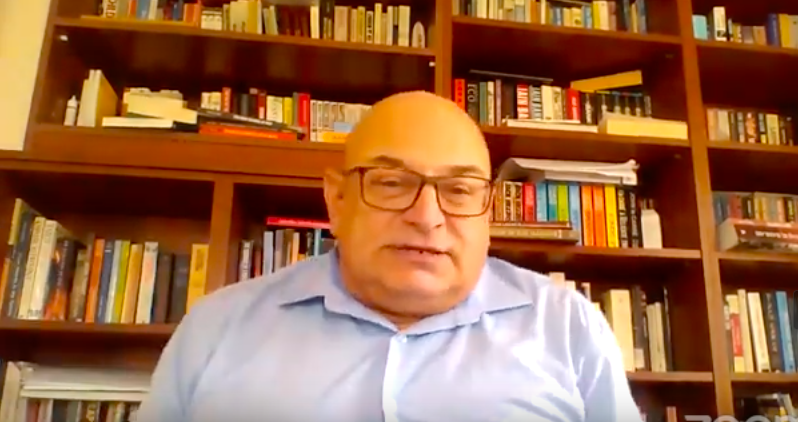
Financial aspect of Türkiye’s military operations
Cem Karadeli also discussed the financial aspect of Türkiye’s recent military operations:
“Türkiye is involved in many military operations and has a military presence abroad in Syria, Libya and in supporting UN operations and so forth. We can say that the involvement seems to be continuing in the new government era as well, but obviously to do that you have to have the strong finances. At the moment Türkiye is not as powerful in terms of finances as it used to be a few years back. So we may see some changes in Turkish operations in Syria and in Libya and other operations involving NATO’s.”
Türkiye and the European countries
In the final part of his speech, Cem Karadeli made the following comments on the contentious Türkiye-EU and Türkiye-US relations in recent years:
“European Union is a problem for Türkiye. Recently the visa approval rate for Schengen Zone has dropped to one-fifth of visa approval rate of the sanctioned Russian Federation citizens. So Türkiye may find a way to restore relations with the EU members. I think France is a good candidate for this with President Macron losing more and more popularity and support in his country, and also because France has important stakes in the Eastern Mediterranean in terms of petroleum and natural gas exploration. If Türkiye may establish a mostly economic relationship with France based on mutual benefits then it might help Turkish relations with EU. The same is true with Italy since the two governments’ views are somewhat overlapping in terms of foreign policy. There is also Hungary, with which Türkiye has a very important tie. Maybe Türkiye should focus more on the financial and trade sides of relationships with the European Union countries.”
NATO and the US
“Few years back when you asked to the majority of Turkish academics and Turkish bureaucrats especially foreign ministry Brokers they would say that NATO membership is a burden on Türkiye. With the Russian operations in Ukraine the view changed and everyone said well it’s good that we are in NATO.”
“The relationship with United States is interesting at the moment because on the one hand we appear to be very close allies, but yet we have lots of issues in which we upset each other. Turkish side is more stable at the moment because we have five more years of AK Party government and Erdoğan’s presidency, but on the American side Biden is facing problems. He has approval problems. He has lots of contenders and so on. Türkiye may have the upper hand for the first time in years against United States.”
“Türkiye to satisfy both Russia and the West”
“Russian Federation and Türkiye has great bonds beyond what the Ukraine campaign might bring or destruct, from the relationship of the nuclear power station, touristic, commercial, financial. On the one hand our Western allies are telling us that it’s very good that Türkiye is establishing good relations with the Russian side, but on the other hand they are saying you are going way too much further. So we have to satisfy both sides.”
Other cooperation options for Türkiye
“To do that I think Türkiye has to focus on some new cooperation with Shanghai Corporation Organization, African Union, ASEAN and Mercosur, and possibly most importantly with India. This might help us quite a bit in the future.”
Alexander Sotnichenko, Head of the Rossotrudnichestvo office (Russia)
The second speaker of the webinar was Alexander Sotnichenko. Sotnichenko focused his speech on the idea that Türkiye has reached an edge in its relations with the West and the United States and is being forced to make choices.
Unprecedented Western pressure on Turkish elections
“Türkiye faced really unprecedented pressure on the election process. I don’t remember any similar example before. The publication of the Western political scientists in media, numerous meetings between the Western politicians and Turkish opposition leaders, also the meetings between foreign diplomats and the leaders of opposition, and so on.”
“Erdoğan becomes toxic for the West”
“The situation looks like the second step of the relations between West and Russia 10 years ago. Putin at that time was still a legitimate leader but already ‘authoritarian’ and ‘non-democrat’ by putting Russian national interests above the universal liberal values. I see Erdoğan is on the same stage. It looks like Erdoğan becomes toxic to the West.
“History of authoritarian regimes”
“There are two possible ways that Türkiye is foreign policy to fix it.
The first way is to take some steps towards Washington and there are plenty of possibilities to do so. For example Türkiye can arrange some sanctions against Russia, give more support to Ukraine, criticize Russia, Iran or China. The West will accept all these steps and maybe the US will help Türkiye with money to fix the economical crisis.
But I hope Erdoğan knows the history of the so-called authoritarian regimes. We remember the destiny of Milosevic, Gaddafi and Mubarak and so on. They were never forgiven and in the result they were imprisoned or killed. I don’t think Erdoğan is really ready to do a pro-Western turn in his foreign policy.”
Erdoğan and Putin against the “sacred value” of the West: the LGBT
“Erdoğan has shown this during his victory speech in İstanbul. I think it’s very important because he targeted the most sacred value of the current Western Civilization: the LGBT rights. We should remember that demonization of Putin started also with his position on LGBT propaganda in Russia. We remember how in London and in some other European capitals during gay parades they criticized Russia and Putin as authoritarian leader. So Erdoğan does the same mistake from the Western point of view.”
Türkiye forced to choose
“In the near future Türkiye will continue the national interest-based policy and we know its efficiency. The balance policy the US and the European Union on the one hand, Russia and Iran and others on the other, 20 years of this foreign policy allowed Türkiye to be more independent.”
“Nowadays the world crisis encourages the American political elite over and over again to ask Türkiye a question: Are you with us or? Are you a real ally of NATO or not? Ankara should answer this question and especially now during the political and military crisis all over the world.”
“We understand that Erdoğan will want to continue his policy of balance but at a point he should choose his way. According to my point of view, during his election at his post-electoral speech in İstanbul, he gave the answer that he will be not with the West.”
Dimitris Konstantakopoulos, Journalist and expert on geopolitics (Greece)
Dimitris Konstantakopoulos delivered a speech discussing the history of Turkish-Greek relations and conflicts, drawing conclusions related to the present.
Decision taken not in Athens or in Ankara, but in London and Washington
Konstantakopoulos stated that in the relations between the two countries, London and Washington have more decisive positions than Ankara and Athens.
“Most people who analyze Greek-Turkish relations see it as an eternal antagonism of two nations since one thousand years. Of course there is some truth here. … But there is also a superimposing factor: The decisions which affected the relations between Greece and Türkiye were not taken in Athens or in Ankara, but in London and in Washington.”
1919-1922: the Imperialists side with Greeks
Konstantakopoulos mentioned that during the Greek-Turkish War between 1919-1922, the British supported the Greeks:
“1921-22 Greece has made a a great military campaign in in Asia. Why? Because British wanted for Mustafa Kemal not to take the Mosul oils.
…
In the spring of 1922 and there was a representative of Moscow who came to Greece. He was Karl Radek, one of the cadres of the Communist International. He proposed a kind of compromise between the fighting Greek and Kemalist forces. At that time the Greek government did not want to have any contact with the Soviet Union.”
After 1955: Imperialists sides with Turks
Konstantakopoulos stated that the period from 1922 to 1955, following the end of the war, was relatively stable. The situation reversed after 1955, he said, with the Turks receiving support from imperialist powers. He provided the following reasons for this shift in dynamics:
“After signing of Lausanne Treaty there was a relative stability till 1955. In 1955 we have the opposite scenario than what I described before. Türkiye has now begun to be used by Washington, NATO, Israel and London.
These countries wanted to create problems to the Greek National Liberation Revolution in Cyprus. Why? Because Cyprus is one of the most important strategic points in the world. Benjamin Disraeli, when taken from the Ottoman Empire, said it was the chain that we were missing the West to the Middle East. Israel is interested for 2000 years to Cyprus. Even the the Zionist movement firstly wanted to create Israel in Cyprus at first. And Henry Kissinger has said those who control Gibraltar, Malta and Cyprus reign over the world.
The independence and union of of Cyprus with Greece were completely unacceptable for the United States, Britain and Israel. This is a basic explanation of what happened in both in Greek-Turkish relations and in Cyprus itself between 1955, I would say, 2003.”
Coup d’état in Greece for Cyprus
Konstantakopoulos discussed the significance of Cyprus and stated that the reason behind the US-backed coup in Greece was Cyprus:
“Most of us, I suppose, know that Henry Kissinger was behind the coup d’état of the military junta. The military dictatorship in Greece in 1967 was imposed not for any internal reasons because at that time there was not any danger of a communist revolution in Greece. It was imposed because this was the only way to overthrow the legitimate government of Macarios in Cyprus and destroy the Cyprus state. The scenario was exactly the same as in Santiago the Chile in September 1973 even in its details.
Then they gave the green light to Bülent Ecevit (the prime minister of Türkiye at the time –UWI) to invade Cyprus. Of course everything did not always go according to the plans. Macarios survived the Republic of Cyprus survived even if it could be exercising it’s sovereignty in a part of the island after that.”
“Our work here is not to reconcile Greeks and Turks, but to make them fight”
In this context, Konstantakopoulos shared the testimony of a British officer in Cyprus:
“There is a very interesting testimony by Martin Packard. He wrote the book ‘Fragments from a Cyprus Diary’ in 1964. Martin Packard was a British officer in Cyprus. When George Ball, the vice minister of the of the United States, visited the Island just after the inter-communal talks. Packard was in contact with both of the leaders of Greek and Turks and seeking for an agreement. George Ball told Packard ‘You have made a terrific job. Our work here is not to reconcile Greeks and Turks, but to make them fight.’ Two days after their talk, Packard was taken back from the office from Cyprus and sent to Malta.“
Stating that the project of Eastmed Pipeline aimed to disrupt the Greek-Turkish relations, Konstantakopoulos said “I gave these historical references to explain what is my position now,” addressed the current dispute between the two countries:
“Since 2003, let me say approximately between 2003 and 2015, President Erdoğan, despite that he did not annul Türkiye’s territorial claims, we must acknowledge that, tried to have a good neighborhood relationship with Greece. Things begin to change at around 2015. On the one hand we have the rise of Turkish nationalism, on the other we have provocations of the United States and Israel.”
After 2010, the big dependence of the Greek state pushed Greece into developing some kind of ‘supposed alliances’ with Israel. The project of Eastmed Pipeline was a bluff. From the very beginning, there was never any serious chance of constructing this pipeline, but the project itself was enough to provoke a very extreme Turkish reaction and to inflate the situation between the two countries.
To give you only one example of this policy, in 2018 the Greek media was flooded with information that ‘Turks are going to attack’, ‘Turks are making preparations for an invasion” etc. The Turkish units, which were reported to do such an operation, launched an operation in Syria. This was a pure provocation, which created a large political echo, and we have arrived to the brink of war at the summer of 2020.
Greece’s military and economic dependence on Israel and the US
“It was really a case of fiction which was creating very serious political and military repercussions which ended up with extremely strengthening the military dependence of Greece on Israel and the United States. They have built maybe 10 military bases in Greece. This created very deep mechanisms of geopolitical dependence, which have been added to the economic dependence we had after the bailout programs imposed to Greece in 2010 in the defeat of our effort with Syriza to overthrow this regime.
One of the results was also that that has facilitated a huge arms competition between Greece and Türkiye and you know the two countries have such weapons that if they are used they are going to to destroy everything in in both countries there can be no victory at such a level of military technology if they are not used they will destroy the economy of Greece and Türkiye.”
No realistic hope for the near future
Konstantakopoulos said that resolving the issues between the two countries, although the most desirable option, does not appear realistic in the foreseeable future:
“Now there is talk again about solving the problems between Greece and Türkiye etc. I don’t believe it. I would of course be very glad with, but I don’t see any realistic hope of finding to adjust an equitable and accepted solution. … The two countries which is deeply entranced into the national consciousness and the national ideology make impossible to solve the problems like territorial waters, at least in the short period.”
The danger of US mediation between Greece and Türkiye
Konstantakopoulos warned that the United States is increasingly intervening in the issues between the two countries and thus greater risks are emerging:
“The US is trying to mediate between Greece and Türkiye. We have to understand that, for example when the US discusses Turkish claims on the on the Greek Islands they never mean giving these islands to Türkiye. The US will never want to see Türkiye as a power in the Aegean Sea because of its strategic importance. Some months ago the Greek Prime Minister has spoken of ‘NATO Islands’. Yes, this is exactly what the US’s goal is, to gain sovereignty using Turkish claims.”
The US’s intervention in the Balkans
Konstantakopoulos depicted the policy of the US and the UK as “consistently creating problems to be able to intervene” by providing examples from the Balkans:
“We have had extensive experience where Americans and British have intervened to solve problems. For instance, in Yugoslavia, they have consistently created new problems. They signed agreements to bring about the Kosovo War, and years later, they pushed for a solution that could potentially create the possibility of a new crisis.
I remember an interview I conducted with Richard Holbrook 20 years ago. I asked him, ‘Okay Richard, I understand that you don’t want Albanians to be under Serbian sovereignty after everything that has happened. Let’s assume that, but why put the Serbs of Mitrovica under Albanian sovereignty?’ He replied, ‘No, no, they must remain in Kosovo and under Albanian sovereignty.’ Why? Because they always want there to be a problem. Without a problem to solve or mediate, there would be no reason for them to intervene in the Balkans.
“Divida et empera”
Most of the Balkan countries were culturally connected to Russia and until recently. They relied on Russia for energy. They aspired to join Europe. This dates back to 1990. If it weren’t for the problems created by the Americans, nobody would need American involvement in the Balkans. This reflects the concept of unipolar imperialism which is nothing new, but has a long history since the time of the Roman Empire’s ‘Divide et empera.’”
Our multipolar response: freezing the problems
Konstantakopoulos framed the most suitable approach as “freezing the problems” based on the belief that resolving them seems unlikely. He also emphasized that this approach serves as “our multipolar answer” to the politics of the unipolar world:
“For me, the best solution would be to freeze the problems and accept the status quo in practice for a long period of time. This could be our multipolar response to the conflicts triggered by the unipolar world. This would allow for a possibility of solving the problems in the future. Trying to impose solutions that are not accepted would only lead to a bigger crisis in the end.
If a problem cannot be solved, it is better to leave it as it is. We have seen examples of such multipolar diplomacy in the relations between Iran and Saudi Arabia or in the agreement for the reintegration of Syria into the Arab League.
A similar approach between Greece and Türkiye would be to establish a long-term moratorium where both sides maintain their stated positions but do not energetically try to impose them. We can live with the status quo, as we have done for a century after the Lausanne Treaty.
The antagonism between Greeks and Turks exists, but we must also be aware of the efforts of imperialism to weaken all states in the region and use them as tools for their own policies. We must always keep this in mind because otherwise, we risk winning in one front but being punished in another. As the ancient Greeks spoke of ‘Eris and Nemesis’”.
Prof. Bessam Abu Abdullah, political scientist (Syria)
Two orientations in Türkiye politics
First of all, to understand the foreign policy of Türkiye after the elections, we need to analyze what the main orientations in Turkish politics are. I could see there are two important orientations.
The first orientation is concerned Islamic conservatives and national conservatives, which are led by the AKP and the MHP, along with some others, and also a small group with a left-wing political orientation.
The second orientation is a more diverse one, combining left-wing, Islamic, and Kurdish elements.
The first orientation, which includes nationalist and Islamic conservatives, represents about 60 to 65 percent of the electoral votes in the presidential and parliamentary elections. This is crucial in understanding Türkiye’s direction in foreign policy. For instance, when we consider the 100 deputies in the parliament from the MHP and the Good Party parties, we can see a strong national orientation combined with an Islamic orientation.
Bassam Abu Abdullah then explained the positions of the US on the one side, and Russia, Iran, China and the Gulf States on the other, during the election process:
“The Western camp openly supported the opposition in the elections”
The second point I would like to mention is that during this election, it became evident that the Western camp, including the United States, was supporting the opposition parties in Türkiye. This can be seen in President Biden’s statement four years ago, suggesting “the need to overthrow President Erdoğan through democratic means”. Additionally, the Financial Times published an article on its front page stating that “elections in Türkiye is crucial” and “Erdoğan must go”. It was clear that the West, including the European Union and the United States, did not desire President Erdoğan to remain in power for another five years. They perceived him as a potential threat, and as a result, they openly supported the opposition led by Kemal Kılıçdaroğlu.
In contrast we could notice that Russia, Iran, China and the Gulf States supported President Erdoğan.
Not just domestic affair, but also a confrontation between two main foreign policy orientations
Bessam Abu Abdullah stated that the elections in Türkiye was not only about domestic politics but also a “confrontation between two main foreign policy orientations”:
“The last elections in Türkiye was not just a domestic affair, but also a confrontation between two main orientations in foreign policy. The first orientation could be described as a more independent stance for Türkiye, aiming to be neither part of the West nor the East. Many politicians and elites argue that Türkiye has been a member of NATO for over 70 years and now it should prioritize its own national interests.
On the other hand, the opposition in Türkiye openly advocated for good relations with the United States, NATO and the EU. as well as a revival of the policies pursued during the AKP era in 2002. We can say that the opposition is now pursuing the policies of the AKP in 2002 when it was newly established. Even one of Mr. Kılıçdaroğlu’s advisors, Ünal Çeviköz, mentioned during the election campaign that they will remind Russia that Türkiye is a member of NATO.
Relations with the US, EU, Russia, Iran and China
“Depending on this analysis” said Bassam Abu Abdullah and elaborated the prospects of Türkiye’s relations with its Eastern and Western neighbors:
“We will not see stable relations with NATO and the West because President Erdoğan and his team are aware that the West was against them during the elections. However, Türkiye cannot completely sever ties with the West due to economic problems and the fact that Turkish banks are part of the Western financial system. Leaving the West is not an easy option for Türkiye, and actually nobody is asking Türkiye to do that. Türkiye will continue to maintain its normal relations with the European Union, but without any expectation of EU membership.
The second axis is to strengthen relations with Russia, Iran, and China, moving towards the East and aligning with emerging world powers. Türkiye should be part this new world order.”
The collapse of “Muslim Brotherhood project”
Bessam Abu Abdullah focused on the Syria-Türkiye relations after the comprehensive geopolitical analysis. He first discussed “the collapse of the Muslim Brotherhood project”:
“The investment of many Arab states in the Muslim Brotherhood during and after the ‘Arab Spring’ is already collapsed in Syria, Tunisia and Egypt. Now nobody is supporting this orientation and I think for Türkiye is not beneficial to completely leave this one. Parallel to that, we could see that Turkish officials are speaking more with national sentiment than Islamic one.
“Syria, Russia, Türkiye and Iran had a quarterly committee in Moscow, with two meetings between ministers of defense and the chief of intelligence agencies.
They talked about two important things. First of all to create a professional committees to work on the ground and to create what they called “operational committee” between Syria, Türkiye, Russia and Iran. There is no information about what are the developments in this committee, but I think that is preference because this is a sensitive question, which needs more secret work than to talk in the media.
Besides there has been the quarterly meeting between foreign deputy ministers in Moscow. They created a committee for normalizing relations between Syria and Türkiye.”
Bessam Abu Abdullah stated that the two countries are working on three files in the negotiation and provided explanations for each of them:
Three files on the table: 1. The refugees
“I can mention here three files on the negotiation table. The first: The file of refugees. We witnessed the importance of that issue for the public opinion during elections campaigns.
President Erdoğan said that they will start to build in the north of Syria houses for refugees by financial support of Qatar. I think this project will not be succeeded and it is a kind of propaganda to address to the public opinion in Türkiye.
The issue is very complicated and we cannot also solve this file by speeches and so on, but only by a direct cooperation between two governments and intelligence agencies.
The United States and the EU are trying to stop returning of the refugees to Syria. They are politicizing this file and they want to play this card.
Bessam Abu Abdullah also referred to a thought echoed in Türkiye, stating, “Sending refugees without any preparation is not acceptable.”
The second file: the withdrawal of the Turkish Army from Syrian territory
The second issue is the withdrawal of the Turkish Army from Syrian territory. I think that Damascus sees this as the first step towards normalizing relations with Türkiye. Damascus expects guarantees from Russia and Iran in this regard. However, Ankara has been attempting to delay this step, despite the agreement between President Putin and President Erdoğan in 2019. Erdoğan had promised to withdraw from the M4 Highway, but this has not yet been done. Damascus is eagerly expecting this trust-building step from Türkiye.
The third file: the fight against terrorism
The third issue concerns the fight against terrorism. There is an important mutual point with regard to this matter. During meetings between defense ministers and the heads of intelligence agencies, it has been emphasized that both Syria and Türkiye are committed to combating all forms of terrorist organizations. This includes groups such as PKK, YPG, Hayat Tahrir al-Sham (formerly known as Al-Nusra Front), and others. However, the priority for each country differs. Türkiye is focused on combating the PKK and YPG, while Damascus sees the fight against extremist groups in Idlib as the first issue to be addressed.
Bessam Abu Abdullah also noted that due to Türkiye’s previous policies, there is a lack of trust towards Erdoğan among Syrian elites and society.
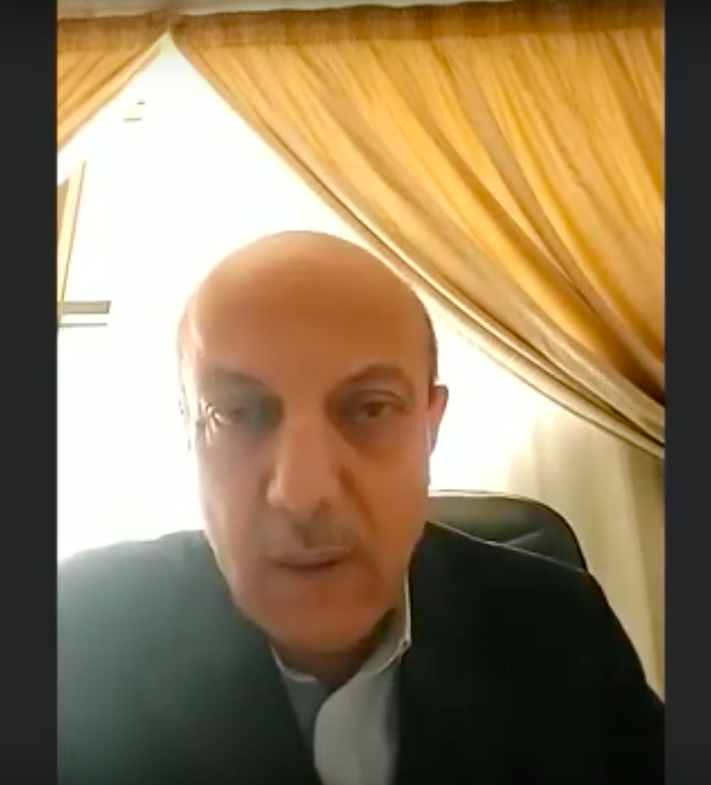
Bessam Abu Abdullah emphasized the significance of Syria’s return to the Arab League. He mentioned that with the resilience of Syria and President Assad, there has been a change in the perspectives of Türkiye and other regional actors:
The resilience of Syria and President Assad
“A new factor in this process is the return of Syria to the Arab League. This development could have significant implications for Syria’s negotiations with Türkiye. Additionally, it appears that many Turkish elites and officials have altered their approaches towards.
Some believed that the government and President Assad would collapse. However, over the past decade the dynamics in the region have been shifting, and all sides recognize the need to engage with each other. The recent rapprochement between Saudi Arabia and Iran is also an important factor to consider for Türkiye. It is anticipated that there will be more negotiations between Syria and Türkiye, although it is acknowledged that the process will be difficult and challenging.”
“Türkiye needs another approach towards Syria”
“Türkiye needs another approach towards Syria. Syria is the main gate for Türkiye towards the Gulf States and there is no such a gate. It’s the dictatorship of geography this is first thing. Secondly, Türkiye should withdraw from the Syrian territory step by step in coordination with Syria, Iran and Russia. Among other reasons, this military presence costs much to Türkiye in financial terms. And thirdly, some political figures in Türkiye believe that they can decide the future of Syria. Just like Turkish people are sensitive about interference in their internal affairs, so do the Syrians. The future of Syria could only be determined by Syrians.”
Bessam Abu Abdullah concluded by stating that the United States is opposed to the rapprochement between Syria and Türkiye due to its “Kurdish project.” He mentioned that the cooperation between the two countries would weaken the influence of the United States and lead to success in countering terrorism.
Prof. Semih Koray, Deputy Chairman of Vatan Party (Türkiye)
The other speaker of the webinar from Türkiye was Prof. Dr. Semih Koray, Deputy Chairman of Vatan Party.
Semih Koray started his presentation by interpreting the results of the elections in Türkiye.
The elections were between Türkiye and US
“Any evaluation concerning the elections in Türkiye and its aftermath has to take into account two closely related but different axes.
First and foremost, the elections were between Türkiye and USA. The Table of Six was designed, tailored, directed and closely monitored via an operation center by the US. The Table of Six was aligned with PKK and Peoples’ Democratic Party (HDP) and Fethullah Gülen Terrorist Organization (FETÖ), which are sheer tools of the US, simply because the Table itself was formed as a sheer tool of the US as well. The Atlantic System had declared openly and continued to do so until the elections that they aim to overthrow Erdoğan whom they classified as a “bad guy” along with Putin and Xi Jinping. The first attempt was done in July 2016. But the Turkish people and military then crashed the military coup attempt. They tried to overthrow him this time via elections, a plan which failed as well. They now have no other option than working with the “bad guy” in Türkiye.
What has been said so far is, however, only part of the story. It is important to note that the US had no dream about establishing a relatively stable pro-American administration in Türkiye via the Table of Six. Its aim was to deactivate the state apparatus as a tool of national sovereignty and make the way free to the PKK, FETÖ and Western loan sharks, i.e., to create ‘chaos’ in Türkiye. That this plan failed is an important gain for Türkiye and the world.”
Objective and subjective factors in Türkiye against the Atlantic System
Afterwards, Semih Koray outlined the theoretical framework of the relationship between Türkiye and the Atlantic System as follows:
“In a country like Türkiye, where all the objective forces drive the country towards Eurasia and, subjectively, the anti-American sentiment is very high – varying between 80 and 90 % according to the polls – and in addition where a majority of the people regards Russia and China as friendly countries, having a bridgehead only does not suffice for America not to lose its hegemonic power over Türkiye entirely. Thus, it also has to try to keep Türkiye confined to the Atlantic System on the political, military, ideological and cultural planes, which amounts to restricting the resistance of the national forces in Türkiye against the Atlantic System to the tactical plane and preventing it from rising to a strategic level.”
This forms the second axis that has to be taken into account in evaluating Türkiye’s stance in the aftermath of the elections. The source of the present problems of Türkiye concerning national security, economy and culture is the Atlantic System. These problems have become so heavy that there is not even a partial solution to any of them within the Atlantic System. There is no doubt about that Türkiye should base its solutions mainly on its own potential and power. But to strengthen its own power and turning its own potential to material force, Türkiye is in need of strategic international cooperation with Russia, China and its neighbors – Iran, Syria, Iraq, Azerbaijan – and with other Eurasian countries, in general. The Great Decision for Türkiye is thus to get out of NATO, step out from the Atlantic System, by also normalizing its political, economic and diplomatic relations with European countries on an egalitarian and mutual benefit basis.
The election results also point that the Turkish people still seek solutions within the present system. However, the very fact that they attached great importance to the independence and sovereignty of Türkiye at the elections in spite of great economic difficulties also shows that the Turkish people are quite open to solutions outside the system that are implementable by not respecting the restrictions imposed by the Atlantic System.”
The need to settle polarization in Türkiye
Semih Koray emphasized the polarization in Türkiye and stressed the need to take measures to address it:
“The election results also reflect the extent that the polarization in the society has reached. To lessen this tension, which the Atlantic System will undoubtedly continue to manipulate further, is a prerequisite for Türkiye to cope up with the difficulties it faces. It is thus important to note that a great majority of the supporters of the Table of Six are not supporters of imperialist hegemony over Türkiye. One partial rationale underlying their stance is that they still believe that the West will shape the future. Thus, the success in coping up with the difficulties by getting out of the Atlantic System will not only induce trust to Türkiye on the part of its Eurasian partners, but it will also be the best antidote against this illusionary stance that a considerable portion of the Turkish people seem to have.”
What Türkiye should do now?
After that, Semih Koray listed his thoughts on the steps that Türkiye needs to take in the near future:
“The Turkish elections mark a historical turning point. But the aftermath of the elections is to be even more historical. In the near future, Türkiye’s foreign policy will be tested once more in certain crucial regional issues with a global impact. They will form a yardstick for the Turkish government’s stance. Such issues can be exemplified as follows:
– Disabling the separatist and fanatic terror organizations in northern Syria via military cooperation between Syria, Türkiye Russia and Iran within the framework of territorial integrity of Syria.
– Resisting the expansion of NATO towards the East in a determined way and putting the military bases of US and NATO under the control of Turkish Armed Forces as a preparatory step towards getting out of NATO.
– Designing and implementing effective policies to put an end to all US military bases in the region, in Greece, Syria and Iraq along with Türkiye.
– Adopting a determined stance against all sanctions imposed by the US.
– Playing an active role in enhancing China’s One Belt – One Road Initiative with an aim to turn Türkiye into a production base.
– Taking measures against the reign of US Dollar on the world finance and trade.
– Working towards the inclusion of countries as Russia, China and Iran into the Organization of the Turkish States with an aim to turn the Turkish population living in those countries into a cement of Eurasian unification.
– Enhancing cooperation with Russia for strengthening the Eurasian unity by normalizing the relation with European countries and preventing Europe from becoming a reserve power of the US.
The common nature of all these issues is that they represent a rise from the tactical to a strategic level of Türkiye’s foreign policy. There is no doubt that the US Administration will continue its threats against Türkiye and try to frighten the Turkish Government in order to prevent the adoption of a strategic approach in that regard. What will make the aftermath of the elections historical is that the people will demand not to get frightened by these threats.”
Türkiye and “Developing World”
In the final part of his speech, Semih Koray discussed the relations between Türkiye and the “Developing World” and “Eurasian countries”:
“Last but not least, it is crucial to relate all this to the strategic aim of the US. The rise of a new system from Asia that can compete with the Atlantic System in all fields of life makes the imperialist system face a matter of life-and-death. It has to be taken into account that this situation increases the risk-taking coefficient in the strategic behavior of the US.
No power launches a world war if it does not believe that it can win it. The strategic aim of the US is, however, to restore its position by changing the balances in the world in such a way that will enable it to win a global war against the Developing World in case it launches it. The US cannot win such a war if the Eurasian unity is strengthened and USA fails in turning Europe into a reserve power of its own. It is thus very well possible to deter it from launching such a war under the present circumstances. But it is important to note that every gain on the part of the US takes the risk of such a war closer, while every loss of USA reduces this risk. This aspect should be taken into account not only in Türkiye’s foreign policy, but in the foreign policies of all the Eurasian countries. Thus, the failure of America’s plans in the Turkish elections is good news for the entire world.”
Dr. Elie Hatem, lawyer (France)
The last speaker of the webinar was Elie Hatem.
Hatem began his speech by stating, “The main idea of my topic is this new multipolar world that we are witnessing.”
He then described the expectations and his personal stance at the time when the Cold War came to an end, as follows:
“We were expepting a free world when the Soviet Union collapsed”
“We all remember that the world was divided into a free world and what we used to call totalitarian. We, and personally I, were against totalitarism and was like a big fighter defending the values of the free world and the respect for international law. We were very happy, and even myself, when the Soviet Union collapses. We were waiting for a new world of the respect for international law and the world of peace, security and equality between states and respecting the sovereignty and civilization of each.
Instead of free world there comes totalitarism
“However, little by little, we saw that we were totally deceived. I personally was so surprised to see the whole world falling under the rule of totalitarism. I will give you one example that we are feeling in the Western countries. We are watched and monitored all the time, we cannot talk freely, our mobile phones are always close when we have a meeting, all our transactions are examined by companies and bankers.
“The police of the world”
In international relations we witnessed to a lot of violations of international law. We all remember that at the end of the Dayton Conference there came the war in Yugoslavia. A new power has emerged as a kind of the police of the world, which is the United States of America with imposing rules, sanctions, military interventions etc.
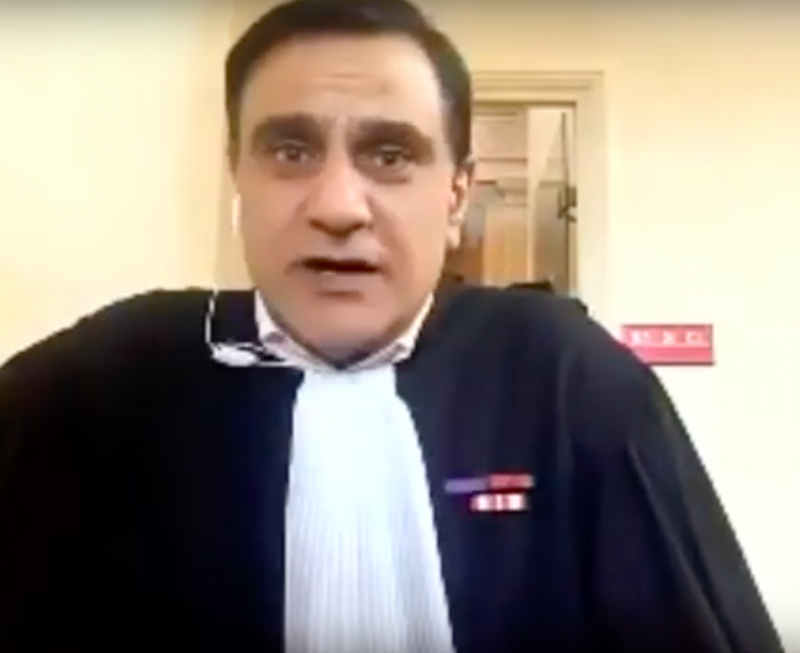
“A world with a dictatorship without an apparent dictator”
“I can give you my testimony as I was the advisor of late Boutros Boutros-Ghali, the former Secretary General of the United Nations. He was feeling that the United Nations became under the hegemony of the US. Washington is not far from New York and the headquarter of the United Nations is in New York. He was aware that the UN was under the control of the US and stood against it. This is why he was not reelected. This is how the situation remained on the international scene and we were feeling that we are in a world with a dictatorship without an apparent dictator.”
The turning point: the war in Ukraine
“Things changed very quickly since the degradable war in Ukraine. Personally, as so many people, I am against the violence and the war, but the only positive thing that happens in Ukraine that it opens a new perspective. We are feeling that the world is not going to be any more unipolar like before under the domination of the US. We are assisting to the growth of new powers like Russia, China, Iran, Türkiye and many other countries like India and Pakistan.”
Macron for the sovereignty of France
“Recently president of France Emmanuel Macron, on his return from China made a declaration saying that we need not to be anymore under the hegemony of US, and even though we are part of NATO we need to have a kind of a sovereignty. In political terms that that means independence from the US of course. President Macron has been much criticized by many countries of the European Union because many them are under the hegemony and the pressure of Washington.”
“My message is that we are at the end of the unipolar world. We see the birth and the aggregation of new institutions like the Bank of Development, which is located in Shanghai, which will replace the World Bank. The international monetary funds are under the domination of the US, however the African continent, the southern American continent, most of the Asian countries, the Middle Eastern countries, even many European countries including some states of the European Union like Hungary, Greece and France is starting go free from this American hegemony.
Maybe the United Nations should either disappear and we create a new organization like the League of Nations or we can transform the United Nation in a way to give all the state members more power. We are waiting now for new outside institutions organizations similar to the ones under the American domination, like BRICS.
And maybe with this new world we can make sure that all the countries will respect international public law and we can reach to a balanced world.”







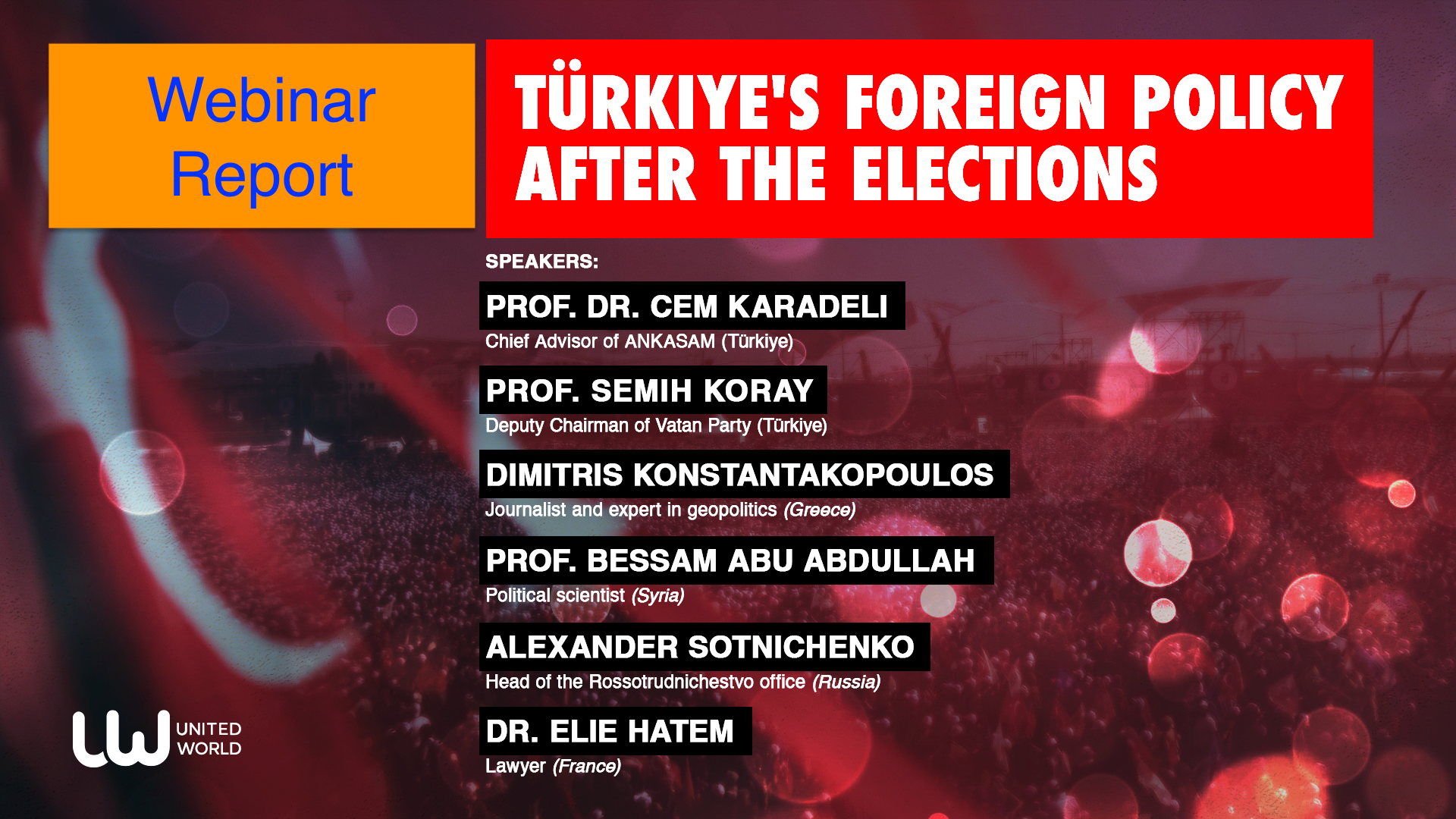
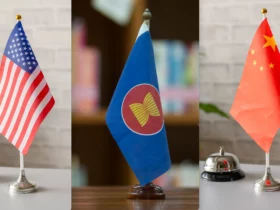
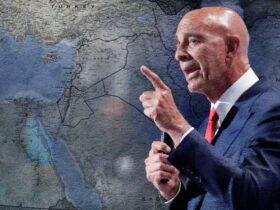
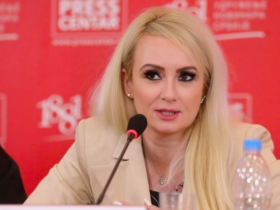
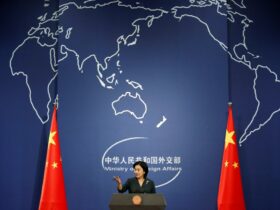
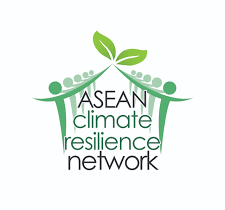
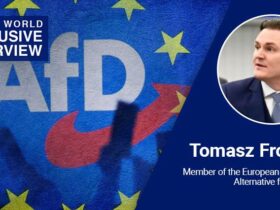

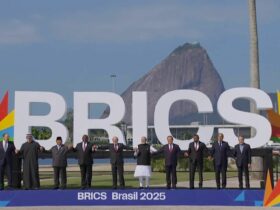

Leave a Reply